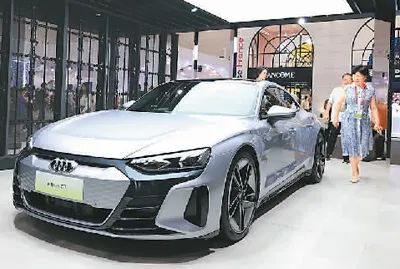

New energy vehicles displayed at the booth of German brand Audi at the fourth Consumer Expo.
Xinhua News Agency reporter Yang Guanyu
Germany is the traditional powerhouse of the automotive industry, with a century of automotive design, production history and perfect industrial supply chain. However, in recent years, with the acceleration of the trend of new energy transformation of the car, Germany, the car “teacher” has encountered new problems, many traditional auto parts manufacturers have recently encountered operational difficulties, once proud of the supply chain scenery is no longer, reflecting the German car electrification transformation road facing multiple challenges.
German car seat manufacturer Lei Carlo recently filed for bankruptcy. This enterprise had for BMW, Mercedes-Benz, Lamborghini and other well-known car brands production seats, its bankruptcy has become the latest example of many German auto parts enterprises operating difficulties.
German consulting firm Falkensteiger Holding data show that in the first half of 2024, a total of 20 German auto parts suppliers with annual revenues of more than 10 million euros filed for bankruptcy, a year-on-year surge of more than 60%. There are also some companies in order to reduce costs and increase efficiency, had to lay off employees or close non-core business.
Analysts said, parts manufacturers operating difficulties, on the one hand, the reason is the weak economy, domestic production continues to shrink leading to a decline in demand; on the other hand, the wave of new energy changes in the automotive industry also caused a greater impact on the traditional supply chain. German Automotive Research Center said that the German auto parts companies facing operating pressure is mainly concentrated in the field of internal combustion engines.
Compared with traditional fuel vehicles, the number of parts required for electric vehicles is greatly reduced. German Hanover SME University of Applied Sciences automotive experts Frank Schwope predicted that by 2030, the German automotive supply chain jobs will be reduced from the current 270,000 to 200,000, weakening the influence of the German automotive industry.
New energy change brings a huge impact, the German car electrification road is not smooth. Mercedes-Benz announced at the beginning of the year, will be 50% of its electric car sales accounted for the realization of the target time from 2025 postponed to 2030; Porsche announced to give up the 2030 electric car sales accounted for 80% of new car sales target; Volkswagen Group is also considering the closure of the Audi Q8 e-tron electric car factory in Belgium.
Meanwhile, the German federal government announced in December 2023 the early termination of subsidies for electric cars, a move that intensified the wait-and-see mood of consumers. Data from Germany's Federal Motor Transport Authority showed that new electric vehicle registrations fell 36.8% year-on-year in July; the market share of newly registered electric vehicles in Germany in the first half of the year fell to 12.5% from 15.8% in the same period last year.
In view of the change in market demand, many vehicle manufacturers have slowed down the electrification process this year, and continue to cancel or postpone orders, which further aggravates the business difficulties of spare parts suppliers. Nevertheless, some German auto parts head enterprises still maintain a positive attitude to deal with the transformation challenges. For example, Bosch plans to launch about 30 EV-related projects this year; Continental plans to spin off its core automotive division and seek an independent listing; and chipmaker Infineon is focusing on automotive digitization to find new profit growth points.
“The current market situation is not good, resulting in the electric drive train production line, which we have invested a lot of money in establishing, being partially idle.” ZF CEO Ko Haoche said, “But the future of the automotive industry belongs to electric vehicles is certain, companies have actively invested in this field, and will continue to invest heavily.”
Schwope also believes that German parts manufacturers need to adjust their strategies as soon as possible to adapt to the new competitive landscape. Small enterprises with limited capital can cooperate with large enterprises to obtain technical support through technology transfer or joint research and development, while large manufacturers need to utilize their scale and R&D advantages to explore new growth paths.
Declaration: This article comes from the Xinhua News Agency.If copyright issues are involved, please contact us to delete.